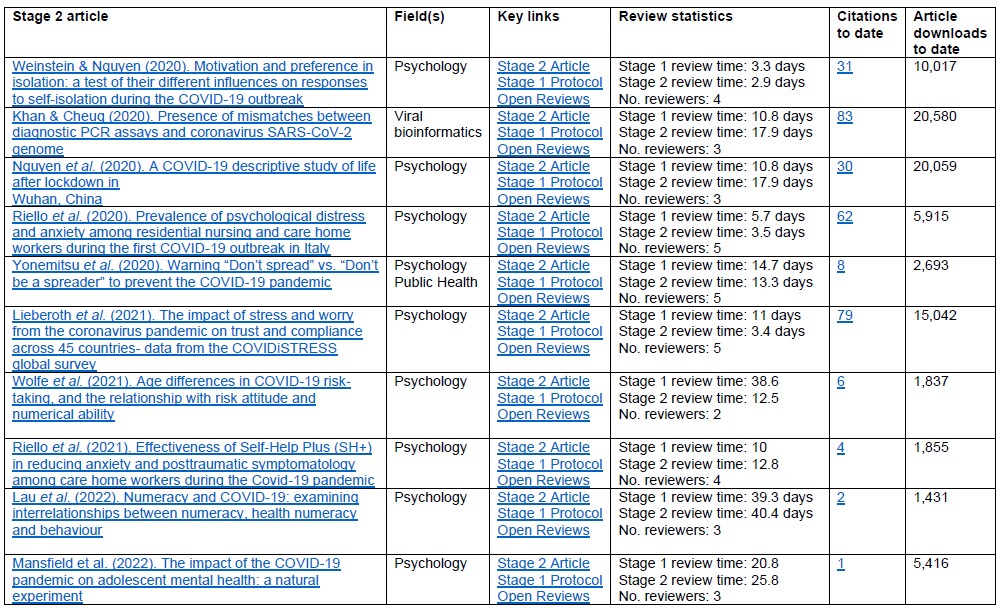Royal Society Open Science Registered Reports’ Editor, Prof Chris Chambers, and Senior Publishing Editor, Andrew Dunn, review the rapid peer review initiative for Covid-19 Registered Reports set up in response to the pandemic.

Shortly after the UK went into its first national Covid-19 lockdown, Royal Society Open Science issued a call for Registered Reports submissions that would be peer-reviewed under an unprecedented time scale if they proposed to tackle research on Covid-19. This initiative was launched by our Registered Reports’ Editor, Prof Chris Chambers.
As has been explored previously in this blog, Registered Reports are an article type devised to improve the quality of study design for hypothesis-driven research. In calling for Registered Reports to be submitted, the journal wanted not only to play our part in encouraging high-quality studies to respond to the pandemic, but to also raise the profile of this article type and so encourage researchers to use them.
Readers may reasonably ask ‘Why are you revisiting the rapid peer review initiative for Registered Reports now?’, and the answer is three-fold. Firstly, after two-and-a-half years, we felt it was a good time to take stock of the initiative – what happened? What have we published? What was the response from the community?
To-date, we’ve received 19 submissions of Covid-19 Registered Report proposals, of which 15 have received Stage 1 in-principle acceptance (IPA), 3 were rejected, and the remaining manuscript was withdrawn by the authors prior to IPA. Two-thirds of the papers receiving IPA have gone on to generate final, published Stage 2 articles, all of which include the full peer reviews (see Table 1). Not only is the acceptance rate for authors (79% at Stage 1) higher than the average non-Registered Report article (about 50%) but the turnaround times for Registered Reports submitted as a part of the rapid review initiative were substantially shorter than for regular articles at the journal: from initial Stage 1 submission to final Stage 2 acceptance, the median total review time has been 28 days, compared to about 125 days for regular research articles.
Secondly, a key aim of Registered Reports is to improve the quality of study design and published research, and with the theme of this year’s Peer Review Week being 'Research Integrity: Creating and supporting trust in research', it seemed a good opportunity to again outline how Registered Reports can be a key element in building trust in research. Unlike the great majority of published research, which is only peer-reviewed once results have been collected, analysed, and interpreted, Registered Reports first peer review a proposal of a study design before the research is conducted (including hypotheses, protocols/methods, analysis). Assuming the reviewing editors and reviewers approve the proposed design and award Stage 1 IPA, the authors complete their study, and submit the second stage for review (effectively, the complete paper now comprising the Stage 1 study design along with the results and conclusions). By carefully reviewing a study design and helping to identify the challenges and opportunities it presents before authors do the work, Registered Reports can help give an author confidence that their study will ‘work’. Crucially, even if the proposed plan ‘fails’ to produce anticipated results, a Registered Report will still be published with the ‘negative’ outcomes.
If published in a journal with a strong open data mandate and a form of open or transparent peer review (like Royal Society Open Science), Registered Reports can help give readers confidence in the quality of both the inputs (in terms of study design) and outputs (in terms of results). In a world in which objectivity and fact seem increasingly under attack, encouraging the adoption of Registered Reports is an important step in creating and supporting trusted research. Given the products of the rapid review initiative, it can be seen that Registered Reports are helping to meet the demand for trusted research outputs.
The third reason for re-examining the rapid peer review initiative is to announce that we will begin to retire this element of our response to Covid-19 in due course, and revert to more normal service times for review. We want to stress that we still welcome Registered Reports from all disciplines, and perhaps especially so in domains of research that have such substantive effects on societies as world-changing pandemics, and we will continue to waive article processing charges for Covid-19 Registered Reports in the foreseeable future. The rationale for winding down the rapid response element of the initiative is that, whether we like it or not, Covid-19 is here to stay, and although the pandemic is far from over, there is arguably less urgency now to turn around peer-reviewed Covid-19 research proposals than was the case in March 2020.
Of course, we will continue to periodically review the policy and make changes in response to the evolving situation. In the meantime, we wanted to offer our thanks to all the authors, editors and nearly 1000 peer reviewers who answered our call and have helped make the Covid-19 Registered Reports initiative such a success. Thank you, and we hope we can count on you again in future.
Royal Society Open Science is committed to improving the reproducibility and transparency of published research. We encourage the submission and publication of pre-registered studies as Registered Reports. Interested authors considering submitting to the journal should visit the website to find out more about Registered Reports.





